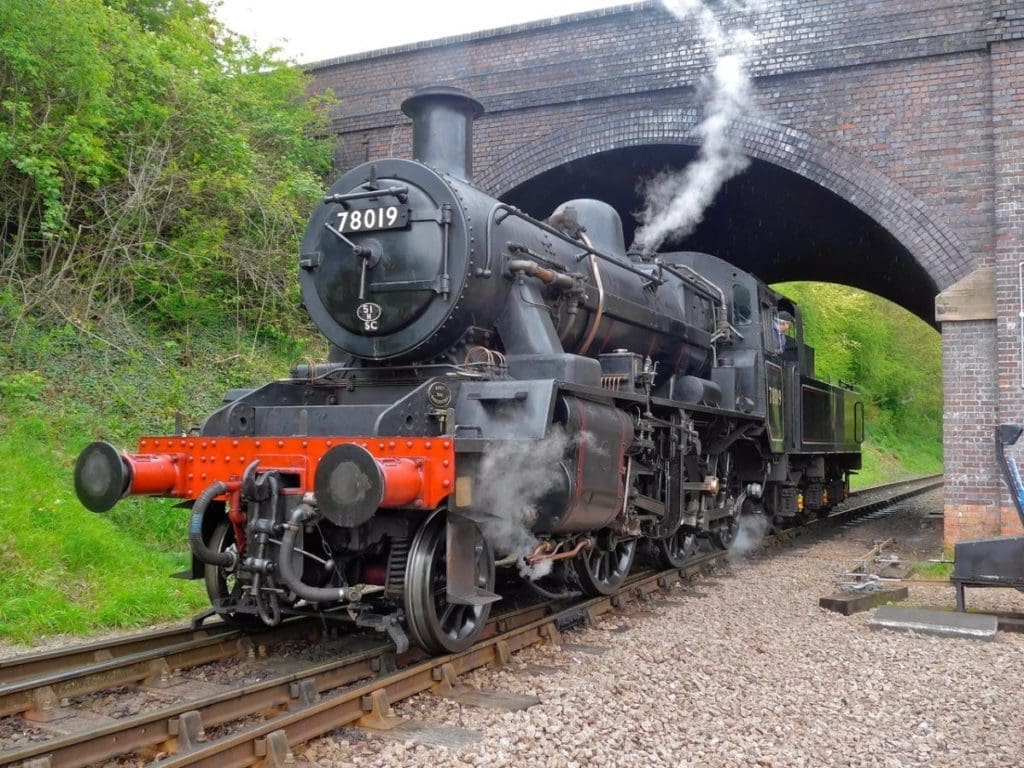
A versatile and popular 69-year-old British Railways mixed traffic 2-6-0 steam locomotive is to join the roster for the Gloucestershire Warwickshire Steam Railway’s (GWSR) Cotswold Festival of Steam in May.
The locomotive in question is BR Standard Class 2MT 2-6-0 Mogul No. 78019 and is appearing courtesy of the Great Central Railway, the Loughborough Standard Locomotive Group and the Charles Newton Trust. 78019 will be operating at the May festival alongside its previously announced bigger brother – BR Standard Class 4MT 4-6-0 No. 75014 Braveheart, adding to an already impressive line-up.
The BR Standard 2 2-6-0s were derived from the earlier LMS Ivatt 2-6-0 moguls, of which 65 were constructed at Darlington Works between 1952 and 1956. They were assigned the 78XXX number range (78000–78064) and predominantly designed for light passenger work. From a mechanical perspective, they were virtually identical to their Ivatt predecessors, with some changes made to the controls and cab to enable the locomotives to fit within a universal loading gauge. Grease lubrication points were added, along with the use of BR standard injectors and clacks.
Enjoy more Heritage Railway Magazine reading every month.
Click here to subscribe & save.
The locomotives were fitted with BR3 3000-gallon tenders, which, like the Ivatt moguls, featured a tender cab to improve visibility and crew protection when operating tender first. A further improvement with the tender involved using Timken roller bearings on the wheelsets. The locomotives gained a reputation among crews for being very sure-footed and soon received the nickname ‘Mickey Mouse’ (as did their LMS Ivatt brethren).
All 65 locomotives were in service by the start of 1957, with up to 10 being allocated to the Western Region (WR) between 1955 and 1966. Standard 2s could be found at Hereford (86C), Machynlleth (89C), Oswestry (89A), Worcester (85A) and Gloucester. Between 1962 and December 1965, a small number were allocated between Gloucester Barnwood (85E/85C) and Gloucester Horton Road (85B), including: 78001, 78004, 78005, 78006 & 78009. Barnwood shed closed on May 4, 1964, which resulted in three being transferred to Horton Road – records indicate that these locomotives were: 78001, 78005 & 78006. Before and after the merger of the Gloucester sheds, one of the Standard 2s regular workings was the goods on the ex-Midland branch from Stonehouse to Stroud, Dudbridge, Woodchester and Nailsworth. The class were also used on passenger workings between Hereford and Gloucester and beyond.
Gloucester Horton Road shed was closed to steam on January 1, 1966. Withdrawals of the class started in late 1963 with the final examples being withdrawn in May 1967.
78019 was completed at Darlington in March 1954 and spent its early years in the North East and North West. Between 1954 and May 1963 the locomotive spent time at Kirkby Stephen (51H), Springs Branch (Wigan) (8F) and Northwich (8E). In late May 1963, 78019 was allocated to Willesden (1A), alongside a small group of 78XXXs to work empty stock trains out of Euston until the end of steam there. After spending some time at Crewe South (5B), 78019 was withdrawn from service in November 1966.
The locomotive was sold to Woodham’s yard in Barry, South Wales and remained there until March 1973. 78019 was purchased by Charles Newton and initially moved to a private site, before being transferred to the Severn Valley Railway where it sat for over 20 years. In 1998, following a deal between Loughborough Standard Locomotive Group Ltd and 78019’s owner, Charles Newton – where joint equal ownership was agreed, the locomotive moved to Loughborough and restoration began. 78019 was returned to steam on the Great Central Railway in 2004 and appeared at its summer gala.
Since being returned to steam, the Standard 2 operated successfully for 10 years and went through routine maintenance, proving itself to be both an economical and capable locomotive. The boiler ticket expired in May 2015 and 78019 was subsequently put through heavy overhaul at Loughborough, with some work including the boiler being carried out at Tyseley.
78019’s overhaul was completed during 2022 before being returned to traffic again in November in time for the railways ‘Last Hurrah’ Gala, where it worked alongside sister locomotive no 78018.
78019 is notable for being involved in a rescue effort when 78018 got stuck in a snowdrift at Bleath Gill near Stainmore Summit at 5am on the morning of February 24, 1955. 78018 had departed Kirkby Stephen with a 4.20am goods train, made up of 20-ton wagons of limestone and minerals. The incident was the subject of the 1955 British Transport Film documentary ‘Snowdrift at Bleath Gill’, directed by Kenneth Fairbairn.
Tickets for the Festival are available online at www.gwsr.com. With up to eight steam locomotives running, it will offer an action-packed timetable of trains, including goods trains and shunting demonstrations. The locomotive and carriage and wagon workshops will throw open their doors for rare behind-the-scenes visits and there will be plenty of other activity at the railway’s stations. The ‘Mickey Mouse’ is the fourth visiting engine to be confirmed. Three other visiting locomotives have been confirmed for the event: Standard class 4 4-6-0 no. 75014 Braveheart, appearing by courtesy of the Dartmouth Steam Railway, Great Western Railway ‘Castle’ class no. 4079 Pendennis Castle, appearing by courtesy of the Great Western Society at Didcot Railway Centre, and L&Y ‘Pug’ no. 11243, appearing by courtesy of the Lancashire & Yorkshire Trust based on the East Lancashire Railway.




